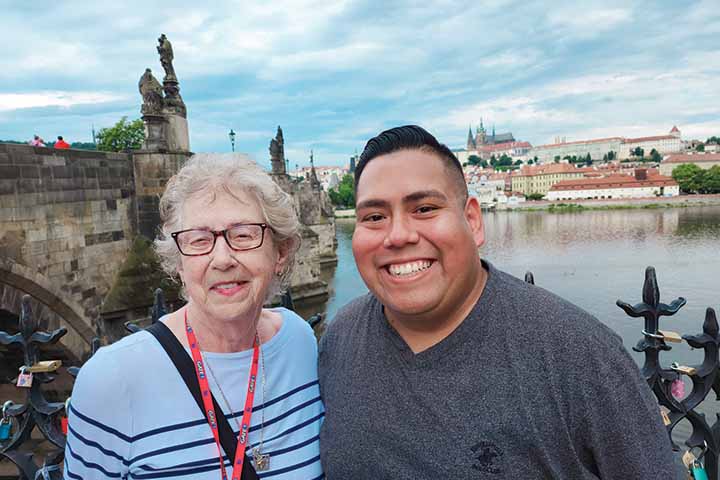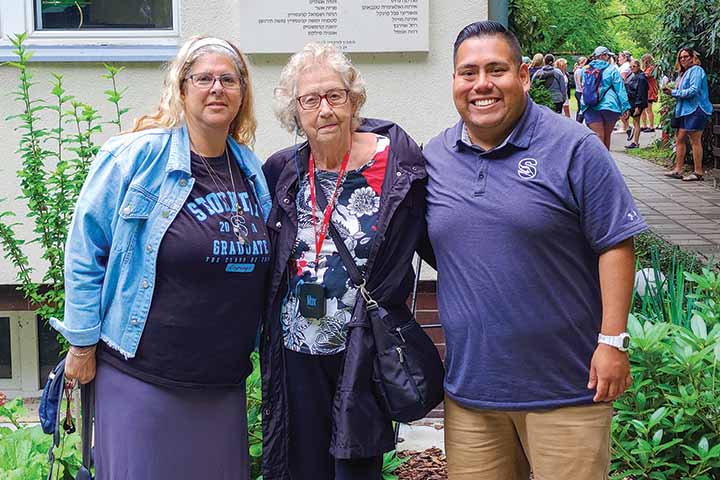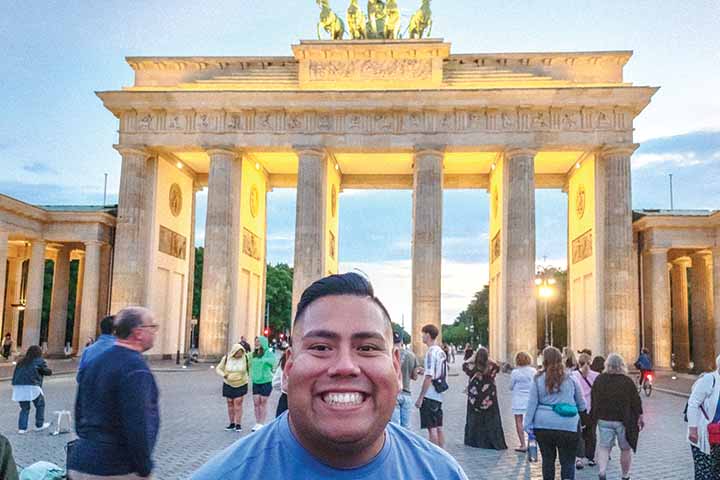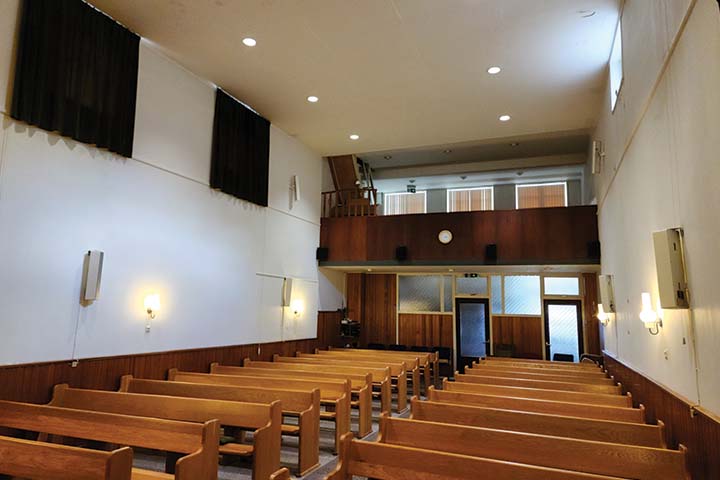Stories of Rescue, Hope and Resilience
By Mandee McCullough '04

By Mandee McCullough '04

"E very day is different here," Irvin Moreno-Rodriguez ’15, interim director of the Sara and Sam Schoffer Holocaust Resource Center at Stockton, said while sitting in the Center's beautiful Schimmel and Hoogenboom Righteous Remembrance Room. His smile is contagious, as is his passion for his work on the Holocaust and genocide education.
He graduated from Stockton in 2015, with a bachelor’s degree in Criminal Justice and a minor in Holocaust & Genocide Studies, and received his master’s degree in Holocaust and Genocide Studies (MAHG) in 2022.
"Just last week, I received a phone call from someone from Cumberland County whose mother-in-law is a Holocaust survivor, and she's still alive and wants to tell her story. And I think she's 90-something years old," he shared. "But, when I looked into her mother-in-law's story, her brother was also a Holocaust survivor and her father. And the whole thing about that was they had thought their father was murdered during the Holocaust."

He explains that the Kindertransport - a system that moved young Jewish children from Nazi-occupied Europe to mainly England - rescued the siblings.
"Their adoptive parents would write letters to their parents. And then, they stopped receiving letters at one point, so they thought the parents were murdered. The mother was, unfortunately, but the father survived, and they ended up reuniting 17 years after the war had ended because the son had grown up in Cumberland County and joined the military and was able to go to Germany and find his father.”
Moreno-Rodriguez goes on to share that these calls and stories make every day different and is why the Center is so important to the community and beyond.
As we sat together, I found myself having the privilege of learning so much about a topic that, at first thought, is so deeply sad but also has so many stories of resilience and rescue woven throughout it. And hope. Moreno-Rodriguez has a gift for sharing those important moments with his students, with the community and with anyone willing to listen.
"'Whoever listens to a witness, becomes a witness,' that's a famous quote by Elie Wiesel, and it always has stood out to me," he shares.
In 2021, Moreno-Rodriguez was appointed to the New Jersey Commission on Holocaust Education, only the second person to represent Stockton on the commission.
This appointment resulted in the trip of a lifetime. He explained that every year, the Commission sponsors a trip for teachers from all over the state and a commission member, led by Holocaust survivor and longest-serving commissioner Maud Dahme.
"This year, it just happened to be me, and I am eternally grateful," he reflected. "So, from July 17-27, me, Maud and 28 teachers from around the state, mainly high school teachers and also members of the NJEA executive board, visited sites related to the Holocaust in Germany, Poland, Czech Republic and the Netherlands."
"It was quite emotional, especially when we started to visit sites related to Maud's story," he says thoughtfully.
He pauses and shares that they went to two places where Maud and her sister Rita were hidden as young girls.
As I sit and listen intently, I can't help but imagine how amazing this woman is. She has returned so many times to places that may represent deep pain. But again, the underlying theme of rescue, hope and resilience shines through as he continues about the trip.
"One of the hiding sites we went to was a home in Elburg, in the Netherlands, which is like this little quaint town. Beautiful, beautiful scenery. The home, now a church, looks like a little mini castle."

What is so special about this specific place is that it directly corresponds to Maud's memoir, "Chocolate, The Taste of Freedom," and a connection Moreno-Rodriguez has to it, as well.
"A few months ago, a man named Wilhelm from the Netherlands wanted Maud's story to be more widely told in the Netherlands, so he took it upon himself to translate her book into Dutch, and the Holocaust Center helped facilitate that.
So, inside Maud's second hiding place, I actually met him. He thanked me in front of the group and gave me a copy of the translated book in Dutch, and so that was just great," he beamed.
But the sweetness of this story doesn't end there. While teachers bustled out into the town to shop and sightsee, Irvin hung back with Wilhelm at the church.
A simple act of kindness or love was a form of humanity and an act of resistance.”
"Wilhelm asks me, do you want to see something?," Moreno-Rodriguez shared, and of course, he responded, "Yes." He continues, "He takes me upstairs to the second floor of this church, where Maud and Rita were hidden. And he shows me the window Maud would look out from as a little girl. And so I saw that. And then I also saw another room where Maud and Rita would actually go into hiding whenever there was a raid or something. And so that was just incredible."
When I asked how he felt at that moment, looking out of her window onto the countryside, he took a moment and said, "You know, surreal, gives you goosebumps. And then also, you hear Maud's testimony. You go to these sites related to where she was hidden. You get overwhelmed because now you have this obligation never to forget and continue telling her story. I feel that weight in a good way - to continue to tell her story, especially since I had this opportunity to go with her, which is so rare. I'm blessed to be able to teach this story to my students here at Stockton."
Every semester, he teaches The History of Anti-Semitism, which counts toward the Jewish Studies minor and the Holocaust and Genocide Studies minor, where he assigns Maud's memoir to the class.
"I truly believe in telling these stories of resilience and rescue and, you know, even working in this exhibit. The exhibit title is "The Extraordinary Heroism of Ordinary People," right? It was these ordinary gestures of goodwill and humanity that became extraordinary during a time when people were bystanders and perpetrators during the Holocaust. So even the simple act of possibly giving someone food or a piece of bread or something to sustain them, you know, could have saved someone's life."
He ties this all back to their summer trip. "And that's what's so important because Maud led this trip for teachers, not only to teach them doom and gloom. That's so easy to do when you're teaching the Holocaust. But to tell these stories of resistance and rescue. Good things and hope, which is vital for the students to hear. You can't just go into it teaching the bad without the good. There were signs of humanity, and Maud talks about that in her story. And then, of course, you know, visiting different sites related to the Holocaust. Hearing about the different rescuers."

Carolyn Stefanou ’18, who received her master’s degree in Holocaust and Genocide Studies from Stockton, was one of the teachers on the trip. She echoed this was a once in a lifetime experience. While there were heart-wrenching moments visiting certain places, she said the camaraderie of the teachers created an outlet that everyone needed after some long, emotional days.
Stefanou has always had a fascination with the Holocaust. She had taken a Holocaust certification program previously, and later attended the Echoes Reflections Seminar at Stockton.
“Gail Rosenthal (may her name be a blessing) told me about the program and the trip they would be taking that March. I immediately enrolled, and all my credits were accepted,” she noted. “When I returned from that trip, I asked my principal and curriculum department if we could have an elective in high school. The answer was yes, and I wrote the first curriculum guide for my district. Since then, I have been educating middle and high school classes about the Holocaust.”
Moreno-Rodriguez visited a place he had not ever been to - The Warsaw Zoo. The significance and history of this place were adapted in a Hollywood movie, “The Zookeeper’s Wife,” released in 2017.
He shares that this zoo was a hiding place for Jews. A zookeeper’s home, which they toured, was adorned with eccentric collections of skeletons and artifacts, and also a piano.
“The zookeeper’s wife would play certain music to alert the Jews hiding in the basement that Nazis were coming, and so they would go down, and you see these tunnels that were burrowed where they would hide inside,” he says.
Moreno-Rodriguez had visited Auschwitz two times before this trip, and yet this time he learned something he never knew. He gives some background that he and a few teachers he had connected with were discussing whistling for whatever reason on the bus heading to the concentration camp. This detail is important, trust me.
Once they have arrived and begin their tour, the guide begins to talk about love stories inside Auschwitz. Moreno-Rodriguez points out that love was a form of resilience during a time when Nazis were trying to dehumanize Jews and other victims.
“A simple act of kindness or love was a form of humanity and an act of resistance,” he says.
“Well, the tour guide continues about two Jewish lovebirds that were imprisoned in some sort of torture cells, and the way they communicated was by whistling. Even more personal, I am Mexican American, and the guide said they would whistle a Mexican song to each other.” (Cue the chills.)
Stefanou, who has been teaching in Elmwood Park for 22 years, says her students have already benefitted from this experience. “I have been teaching about the Holocaust for many years using the same materials. I have now updated my slide deck and can share firsthand as a primary source,” she said.
This trip created connections, friendships and a deep understanding of what hope may look like during times of tragedy. Moreno-Rodriguez is excited to see what collaborations come from this experience, from sharing tools the Holocaust Resource Center offers, tours for high school students to enriching Holocaust education and scholarship.
Learn more about Sara & Sam Schoffer Holocaust Resource Center